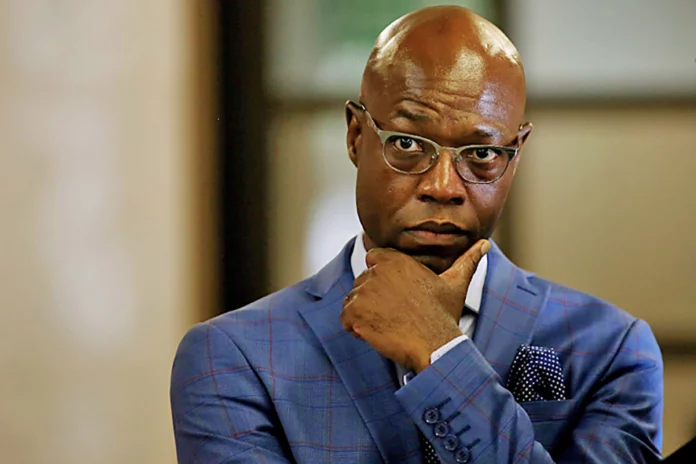Former Eskom interim chief executive Matshela Koko is accusing the Zondo Commission of Inquiry into State Capture of kicking the can down the road in clearing his name, which it soiled in its final report about his role in state capture.
Sunday World can reveal that Koko’s legal team was preparing to get a default judgement of his review application on the adverse findings made against him by the State Capture commission’s chair, chief justice Raymond Zondo. However, the hearing couldn’t be held following a delay by the chief Justice to file responding papers in court.
Zondo ignored Koko’s review application filed in December last year in which the electrical engineer is asking the high court in Joburg to set aside the commission’s findings against him.
He said the commission was biased against him because it did not consider his evidence that he submitted.
Zondo’s legal representatives, Rangata Attorneys, only moved this week to file a notice of intention to oppose Koko’s application, but went further to ask for an extension until May 10.
In a letter to Koko’s lawyers on Thursday, Rangata Attorneys’ lawyer Baitseng Rangata cited “voluminous files” as the reason behind its failure to file responding papers in the past three months.
“We note the time period for the respondent to dispatch the record in accordance with Rule 53(1)(b) of the High Court Rules has lapsed. We confirm that the process of compiling the record has commenced, yet is still ongoing,” Rangata said.
“We hereby request an extension to deliver the record by no later than 10 May 2023. The exercise of gathering information and compiling the record has proven to require more time as we had to go through voluminous files in preparation thereof. We, therefore, apologise for the delay.”
In his founding affidavit file on December 20, 2022, Koko argued that the commission “ignored” his evidence before making adverse findings against him while it elevated without thorough interrogation the evidence of witnesses who falsely implicated him.
Koko is also aggrieved that despite an undertaking by Zondo during his oral testimony that he would be afforded an opportunity to be re-examined by his lawyers, such never happened.
Charged Koko in his founding affidavit: “The Commissioner (Zondo) told me this would happen, but it did not. I was entitled to be heard before an adverse remark, finding, conclusion, or decision was made against me.”
He submitted that despite this, Zondo instead directed him to submit an affidavit to cover whatever he felt the commission’s legal team had missed.
When Koko abided by this instruction, the commission still went ahead to make findings “without reading my affidavit in full” which Zondo in his report argued was not read in full owing to “the enormity of the affidavit”.
According to Koko, this is in contravention of section 33 of the constitution, which demands of the state to give effect to lawful, reasonable and procedurally fair administrative action.
Koko fingered Zondo’s “bias and favouring Glencore” saying his commission failed to investigate preferential treatment that the company received at Eskom in the coal supply wars that centred around Glencore’s Optimum Coal Mine.
In his view, Koko asserted, Zondo “ignored” believable evidence about Glencore’s shenanigans at the power utility that he and former Eskom boss Brian Molefe submitted to the commission.
“Glencore, despite the allegedly unpalatable coal supply agreement, acquired Optimum Coal Holdings (OCH) and Optimum Coal Mine, investing substantial sums of money. Glencore must have thought it had a card up its sleeves. It appointed Mr (President Cyril) Ramaphosa as the chairman of OCH [who] was then an NEC member and the former secretary-general of the ANC, a politically connected personality with enormous influence.”
At a personal level, Koko argued that he takes exception to being associated with the controversial Gupta family that stands accused as the main proponents of state capture that allegedly set in during former President Jacob Zuma’s term of office at the Union Buildings.
It was “irrational and not connected to evidence” for Zondo to conclude that Koko “benefitted from Guptas”, he submitted, saying that the trips he took with his family in December 2015, that the commission found were financed by Gupta associate Salim Essa, was untrue (not financed by Essa).
Koko also wants the court to find that Zondo was biased for dismissing his testimony that Eskom did not procure coal from Gupta-owned Tegeta “at a premium” which the commission labelled as “speculations and inferences”.
“This application is in defence of my constitutional rights against the arbitrary actions of the commission,” Koko concludes his submission.
Speaking to Sunday World on Friday, the emboldened Koko said he believes Zondo never expected anyone to pushback against his report.
“I have come to the conclusion that the commission never thought people would take legal steps to take Zondo for review. They hoped that we would just let it go,” said Koko
“They are surprised that we took it up and they are not ready, hence the delaying tactics. I think they have been caught off guard. I do not think they expected the seriousness we are taking about the review.
“They realised it is not a talk shop or a public relations exercise. If they do not meet the deadline (May 10), we will hold them to account. We will go to court for a default judgement. It does not make sense that they are buying time.”
To read more political news and views, click here.
Follow @SundayWorldZA on Twitter and @sundayworldza on Instagram, or like our Facebook Page, Sunday World, by clicking here for the latest breaking news in South Africa.



